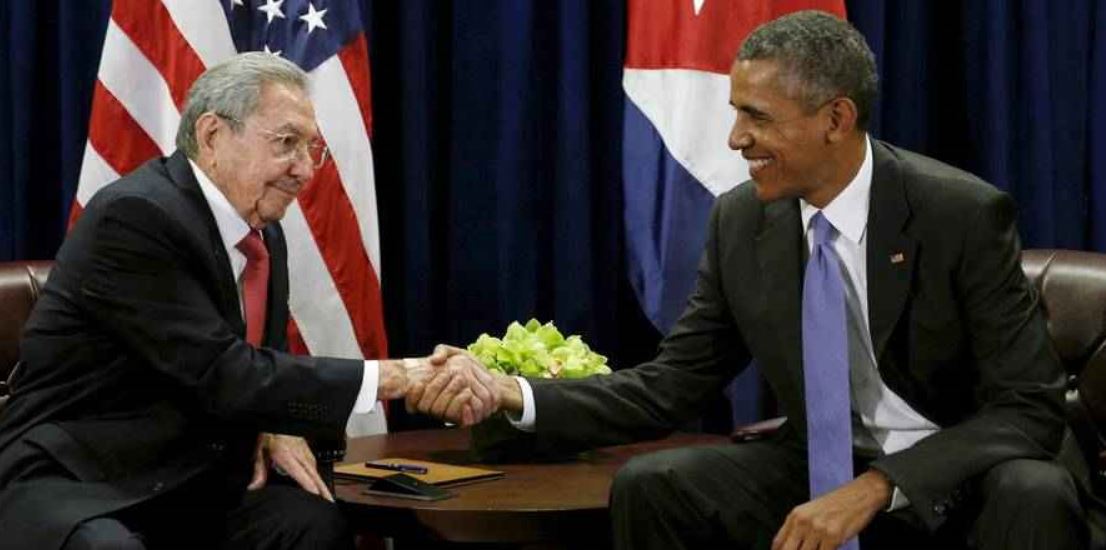
Strait talk: What does D-17 mean to you?
According to a survey released this week, there has been a striking increase in support among Cubans and Cuban Americans living in the United States for President Obama’s policies of engagement and reconciliation toward Cuba since he began making epic changes in the policy on December 17th, 2014.
Compared to the results Bendixen & Amandi reported a year ago, support among Cubans and Cuban Americans in the U.S. for President Obama’s decision to normalize relations with Cuba has risen from 44% to 56%. Support for ending the embargo has spiked to 53% – a jump of nine points from a year ago.
When opinion shifts so significantly in a community that is the epicenter of pro-embargo sentiment – a community that is hardwired politically to Washington, and hardwired emotionally to family members in Cuba – we have to consider what the consequences and causes of that shift could be.
As Congress is leaving town, it is also leaving President Obama’s Cuba policy intact. How unexpected is that?
The biggest threat to the President’s reforms resided in the ability of his opponents to use the Congressional power of the purse to reverse every one of the key actions the President took to expand travel, trade, and diplomacy itself.
After the Cold Warrior embargo supporters larded up the appropriations for four Cabinet agencies with legislation to reverse the new policies implemented by the President, the new budget agreement adopted by Congress to fund the government through September 30, 2016 dropped every provision.
As support among Cuban Americans for the president’s policy has gone up, the fear factor – by which we mean the old style, scorching hot opinion emanating from Miami and New Jersey which exerted relentless pressure on policymakers to keep the old policies in place – has subsided substantially.
No other community in the United States spends as much time in Cuba as do those with families living on the island. What they hear – what they feel – when they visit is reflected in the polling and what we heard when we asked some friends in Cuba this week what December 17th meant to them.
Emilia Fernandez, a specialist in health and IT, and a state employee, sent us her thoughts with one precondition – that we published her name because, she said, “I’m not the kind who [likes] to hide its identity.”
What has the December 17th meant to her? “Nobody can deny the direct relationship between December 17th and the visit of famous artists to our country. I can clearly see the joy of the people now that they [have] had the opportunity to see and enjoy their work live. I’m very happy for that.
“But, I am very upset with the offensive behavior of some U.S. tourists, who are not showing respect for us, trying to demonstrate they are better than us, because of the money they spend loving our culture.”
Marta Núñez-Sarmiento, a sociologist at the University of Havana, took a similar tack to Emilia, but focused her reservations on the U.S. government. She wrote, in part:
“December 17, 2014 became the first moment in our common history when the United States and Cuba decided to established diplomatic relations based on equal and mutually respectful terms. This is the opportunity for both countries to acquire new perspectives by learning from both nations, and to practice restraint from imposing preconceived judgments and values on the other…It is not a ‘quid pro quo’ discussion but one in which the U.S. must acknowledge that it has to lift more restrictions than on the Cuba side. Let us not fail in this course of action for we have much to win.”
Yamina Vicente, an economist who left academia to open up a decorations and party hosting business at an early moment in Cuba’s economic transformation, spoke with the greatest optimism about D-17:
“The resumption of relations between our countries awakens many dreams in Cuba. Within our sector, the ‘cuentapropistas’…receive benefits [from the diplomatic opening in] a direct form. Those companies that have foreign tourists as clients have doubled their sales…The imagination, the creativity has surfaced. Although, these have been short-term effects, the new relations also awaken long-term projects; business that could expand to both lands; imports, exports, and collaboration with others. It’s one word: HOPE.”
Not everyone shares her hopeful view. When a reporter for IPS asked a middle-aged man shopping at a farmer’s market about D-17, he said, “You shouldn’t ask me, because in my view, nothing has changed.”
Maybe. But, we close thinking about a man named Augusto Maxwell who was recently visiting Havana, according to CNN, when his daughter reached him on his cellphone.
“For most people, it would be an ordinary call — she was just checking in on him. But Maxwell’s daughter was in Miami and he was in Cuba — an island with no access to U.S. cell service just a year ago. Maxwell realized right away the call epitomized how much Cuba has changed in just a year. Then he cried.”
Tears of joy celebrating December 17th.
(From Cuba Central)

